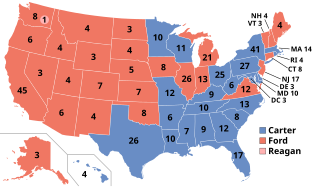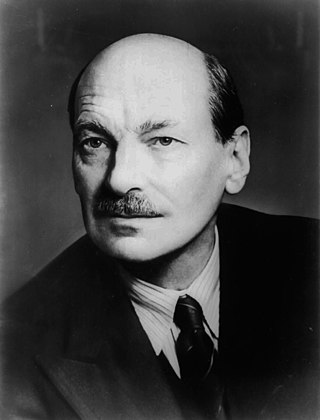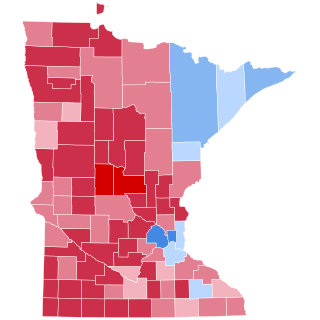
The 2000 United States presidential election was the 54th quadrennial presidential election, held on Tuesday, November 7, 2000. Republican Texas Governor George W. Bush, the eldest son of George H. W. Bush, narrowly defeated incumbent Democratic Vice President Al Gore. It was the fourth of five U.S. presidential elections, and the first since 1888, in which the winning candidate lost the popular vote, and is considered one of the closest U.S. presidential elections, with long-standing controversy about the result. Gore conceded the election on December 13.

The 1996 United States presidential election was the 53rd quadrennial presidential election, held on Tuesday, November 5, 1996. Incumbent Democratic President Bill Clinton defeated former Senate Majority Leader Bob Dole, the Republican nominee, and Ross Perot, the Reform Party nominee and 1992 Independent presidential candidate.
The electoral threshold, or election threshold, is the minimum share of all the votes cast that a candidate or political party requires to achieve before they become entitled to representation or additional seats in a legislature. This limit can operate in various ways, e.g. in party-list proportional representation systems where an electoral threshold requires that a party must receive a specified minimum percentage of votes, either nationally or in a particular electoral district, to obtain seats in the legislature. In single transferable voting, the election threshold is called the quota and it is possible to pass it by use of first choice votes alone or by a combination of first choice votes and votes transferred from other candidates based on lower preferences. In mixed-member-proportional (MMP) systems the election threshold determines which parties are eligible for top-up seats in the legislative body.

The 1992 United States presidential election was the 52nd quadrennial presidential election, held on Tuesday, November 3, 1992. Democratic Governor Bill Clinton of Arkansas defeated incumbent Republican President George H. W. Bush and independent businessman Ross Perot of Texas. The election marked the end of a period of Republican dominance in American presidential politics that began in 1968, and also marked the end of 12 years of Republican rule of the White House, as well as the end of the Greatest Generation's 32-year American rule and the beginning of the baby boomers' 28-year dominance until 2020. It was the last time the incumbent president failed to win a second term until Donald Trump in 2020.

The 1860 United States presidential election was the 19th quadrennial presidential election, held on Tuesday, November 6, 1860. In a four-way contest, the Republican Party ticket of Abraham Lincoln and Hannibal Hamlin won a national popular plurality, a popular majority in the North where states already had abolished slavery, and a national electoral majority comprising only Northern electoral votes. Lincoln's election thus served as the main catalyst of the states that would become the Confederacy seceding from the Union. This marked the first time that a Republican was elected president. It was also the first presidential election in which both major party candidates were registered in the same home state; the others have been in 1904, 1920, 1940, 1944, and 2016.

The 1872 United States presidential election was the 22nd quadrennial presidential election, held on Tuesday, November 5, 1872. Despite a split in the Republican Party, incumbent President Ulysses S. Grant defeated Democratic-endorsed Liberal Republican nominee Horace Greeley.

The 1888 United States presidential election was the 26th quadrennial presidential election, held on Tuesday, November 6, 1888. Republican nominee Benjamin Harrison, a former U.S. senator from Indiana, defeated incumbent Democratic President Grover Cleveland of New York. It was the third of five U.S. presidential elections in which the winner did not win the national popular vote, which would not occur again until the 2000 US presidential election.

The 1976 United States presidential election was the 48th quadrennial presidential election, held on Tuesday, November 2, 1976. Democrat Jimmy Carter, former Governor of Georgia, defeated incumbent Republican president Gerald Ford in a narrow victory. This was the first presidential election since 1932 in which the incumbent was defeated, as well as the only Democratic victory of the six presidential elections between 1968 and 1988.

The Greens is a minor political party in Israel that emphasizes environment protection and quality of life. It was founded and formerly headed by Pe'er Visner. Although the party was never represented in the Knesset, it holds seats in many municipalities across Israel.

The 1945 United Kingdom general election was a national election held on Thursday 5 July 1945, but polling in some constituencies was delayed by some days, and the counting of votes was delayed until 26 July to provide time for overseas votes to be brought to Britain. The governing Conservative Party sought to maintain its position in Parliament but faced challenges from public opinion about the future of the United Kingdom in the post-war period. Prime Minister Winston Churchill proposed to call for a general election in Parliament, which passed with a majority vote less than two months after the conclusion of the Second World War in Europe.

The 1988 Canadian federal election was held on November 21, 1988, to elect members to the House of Commons of Canada of the 34th Parliament of Canada. It was an election largely fought on a single issue: the Canada–United States Free Trade Agreement (CUSFTA); the Progressive Conservative Party campaigned in favour of it, whereas the Liberal Party and the New Democratic Party (NDP) campaigned against it. Mulroney won a governing majority and the agreement was passed into law, even though a majority of the voters had voted for parties opposing free trade. The Mulroney government instituted the Goods and Services Tax during this term as well.

The 1951 United Kingdom general election was held twenty months after the 1950 general election, which the Labour Party had won with a slim majority of just five seats. The Labour government called a snap election for Thursday 25 October 1951 in the hope of increasing its parliamentary majority. However, despite winning the popular vote and achieving both the highest-ever total vote at the time and the highest percentage vote share, Labour won fewer seats than the Conservative Party. That was caused mainly by the collapse of the Liberal vote, which enabled the Conservatives to win seats by default. The record high vote total remained until it was surpassed by the Conservative Party in 1992 and again in 2019.

The 1979 Canadian federal election was held on May 22, 1979, to elect members of the House of Commons of Canada of the 31st Parliament of Canada. It resulted in the defeat of the Liberal Party of Canada after 16 years in power, 11 of them under Prime Minister Pierre Trudeau. Joe Clark led the Progressive Conservative Party to power but with only a minority of seats in the House of Commons. The Liberals, however, beat the Progressive Conservatives in the overall popular vote by more than 400,000 votes. Taking office on the eve of his 40th birthday, Clark became the youngest prime minister in Canadian history.

The 1926 Canadian federal election was held on September 14, 1926, to elect members of the House of Commons of Canada of the 16th Parliament of Canada. The election was called after an event known as the King–Byng affair.

All Ceylon Tamil Congress, is the oldest Tamil political party in Sri Lanka.

The 2005 United Kingdom general election was held on Thursday 5 May 2005, to elect 646 members to the House of Commons. The governing Labour Party, led by Tony Blair, won its third consecutive victory, with Blair becoming the second Labour leader after Harold Wilson to form three majority governments. However, its majority fell to 66 seats; the majority it won four years earlier had been of 167 seats. This would be the last election not won by the Conservative Party as of 2024. This was the first time the Labour Party had won a third consecutive election, and as of the 2024 general election remains the party's most recent general election victory.
The politics of Odisha are part of India's federal parliamentary representative democracy, where the union government exercises sovereign rights. Certain powers are reserved to the states, including Odisha. The state has a multi-party system, in which the two main parties are the nationalist Bharatiya Janata Party (BJP) and the regional, socialist Biju Janata Dal (BJD). The Indian National Congress (INC) has also significant presence.
The Suheldev Bharatiya SamajParty is an Indian political party founded in 2002. The party is led by Om Prakash Rajbhar, former Minister of Backward Classes Welfare, Disabled People development in Uttar Pradesh. The party has its headquarters in Rasra, Ballia district, Uttar Pradesh. The party has a yellow flag.

The 2016 United States presidential election in Minnesota was held on Tuesday, November 8, 2016, as part of the 2016 United States presidential election in which all 50 states plus the District of Columbia participated. Minnesota voters chose electors to represent them in the Electoral College via a popular vote, pitting the Republican Party's nominee, businessman Donald Trump, and running mate Indiana Governor Mike Pence against Democratic Party nominee, former Secretary of State Hillary Clinton, and her running mate Virginia Senator Tim Kaine. Minnesota has ten electoral votes in the Electoral College.

















